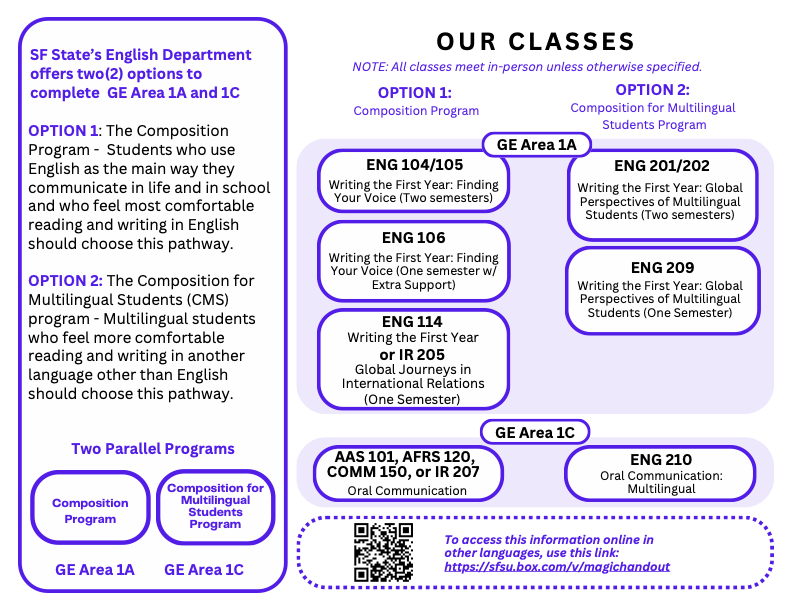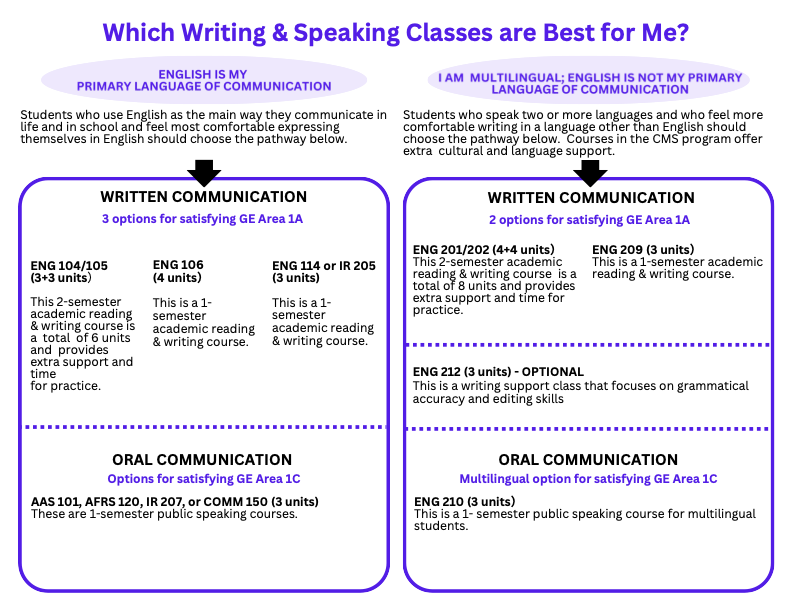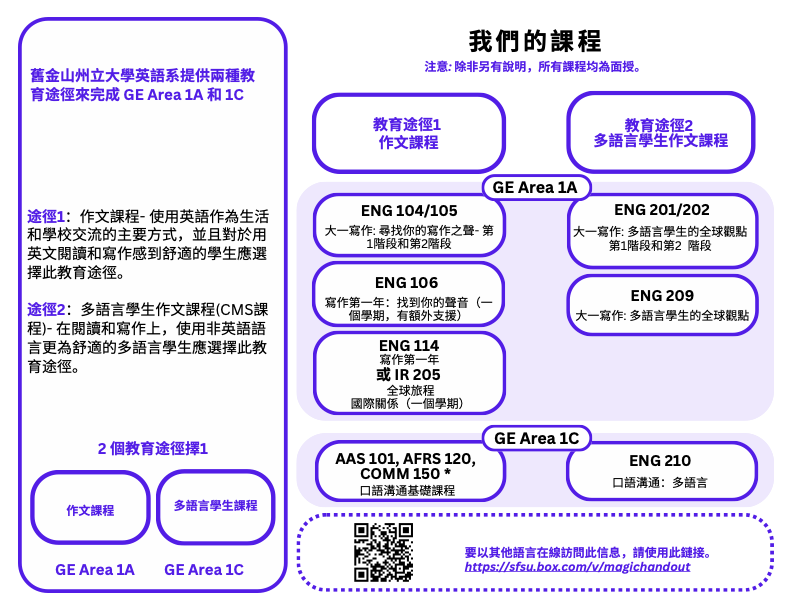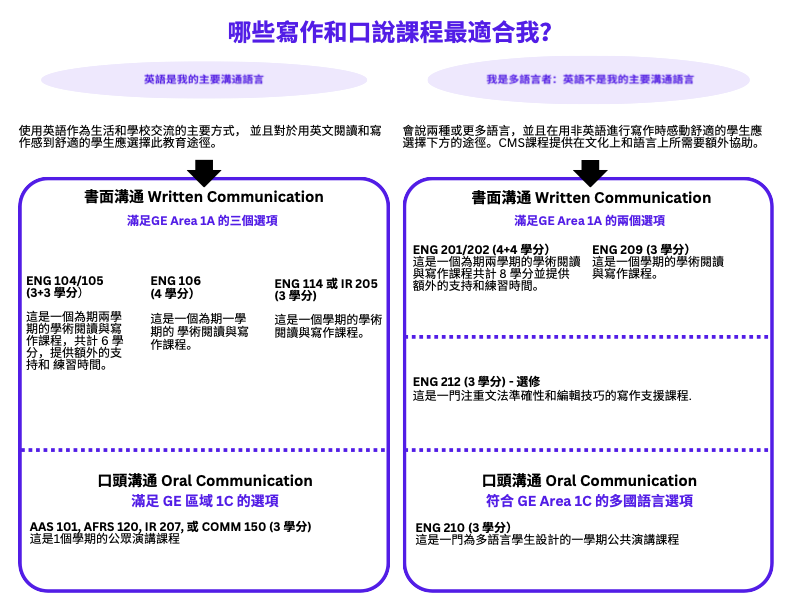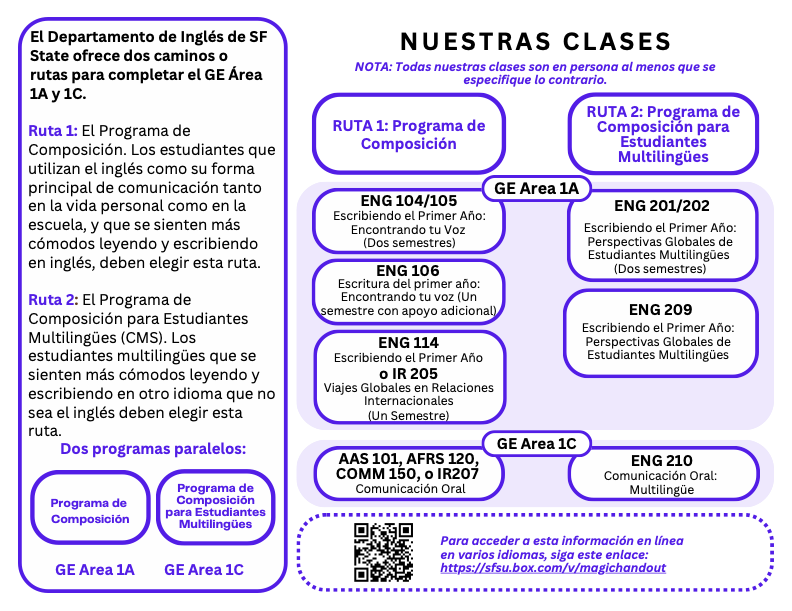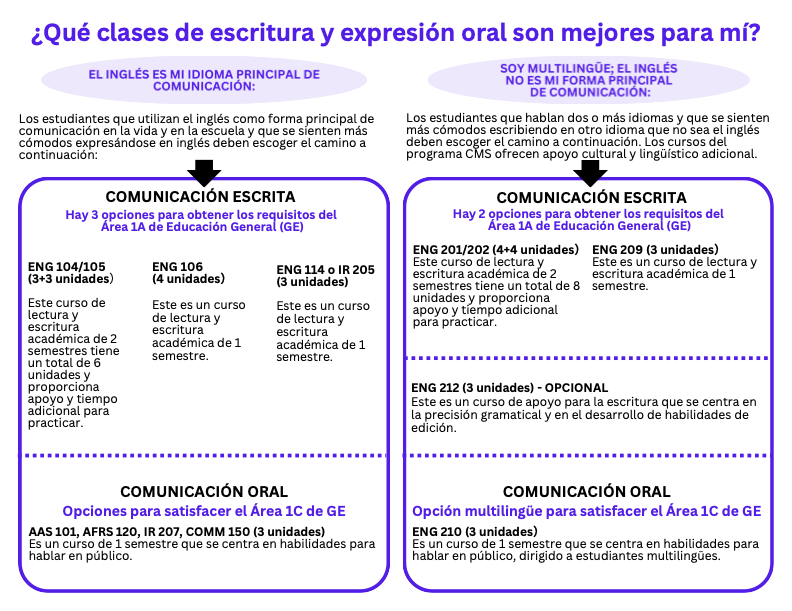Welcome to the Writing Program, where our mission is you! In our courses, you will meet dedicated faculty who value student voice and who will take the time to get to know you and your writing.
Because we place such a high value on personalized education, all of our writing classes are small, and our approach is student-centered. In our courses, you’ll have opportunities to discuss and analyze topics that matter to you. You’ll get individual feedback on your writing from teachers and peers. You’ll have opportunities to form mentoring relationships with teachers and to build community with classmates.
Our curriculum stems from our core values, to empower students’ voices, and to use writing to make a difference in the communities we care about. We are prepared to deliver a high-quality educational experience. We look forward to getting to know you and your writing.
Bienvenido al Programa de Escritura, ¡donde nuestra misión eres tú! En nuestros cursos, conocerás a un profesorado dedicado que valora la voz del alumnado y se tomará el tiempo para conocerte a ti y a tu escritura.
Dado que valoramos mucho la educación personalizada, todas nuestras clases de escritura son pequeñas y nuestro enfoque se centra en el estudiante. En nuestros cursos, tendrás la oportunidad de debatir y analizar temas que te interesan. Recibirás retroalimentación individualizada sobre tu escritura por parte de profesores y compañeros. Tendrás la oportunidad de formar relaciones de mentoría con el profesorado y de construir una comunidad con tus compañeros.
Nuestro plan de estudios se basa en nuestros valores fundamentales: empoderar la voz del alumnado y usar la escritura para marcar la diferencia en las comunidades que nos importan. Estamos preparados para brindar una experiencia educativa de alta calidad. Esperamos conocerte a ti y a tu escritura.
歡迎來到寫作計劃,我們的使命就是您! 在我們的課程中,您將遇到敬業的教師,他們重視學生的聲音,並願意花時間了解您和您的寫作。
由於我們非常重視個別化教育,所以我們所有的寫作課程都是小班制授課,並且我們的教學方式以學生為中心。在我們的課程中,您將有機會討論和分析您關心的主題。您將獲得來自老師和同學對您的寫作的個人回饋。您將有機會與老師建立指導關係並與同學建立社區。
我們的課程源自於我們的核心價值觀,旨在增強學生的聲音,並透過寫作為我們關心的社區帶來改變。我們準備好提供高品質的教育體驗。我們期待了解您和您的作品。
Writing Program Advisors

Coordinator, Writing Program
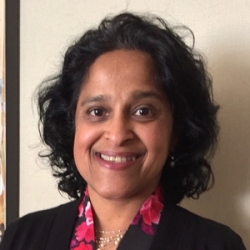
Coordinator, Composition for Multilingual Students

Advisor, Composition for Multilingual Students and Writing Programs
Welcome to the Writing Program at San Francisco State University!
Our writing courses are designed to help first-year students become confident and capable writers who can succeed in the university and beyond. In our courses, students are encouraged to
- Make their voices heard;
- Write about topics that matter;
- Use digital tools to investigate, discover, persuade;
- Make a difference in the world.
We offer writing courses in a variety of formats — in person, hybrid, and online. No matter what the format, we provide meaningful learning, a sense of community and ample academic support. To learn more about our writing courses, you can find course descriptions in 10 different languages! Please see course offerings by language on this page.
If you are a multilingual student and would like to develop your English academic reading, writing, speaking, and listening skills with other multilingual students, we offer yearlong and one semester courses to support you. To learn more about these courses, please see course descriptions below or visit the Composition for Multilingual Students (CMS) page for more information.
¡Bienvenido al Programa de Escritura de la Universidad Estatal de San Francisco!
Nuestros cursos de escritura están diseñados para ayudar a los estudiantes de primer año a convertirse en escritores seguros y capaces que puedan tener éxito en la universidad y más allá. En nuestros cursos, animamos a los estudiantes a:
- Hacer oír su voz;
- Escribir sobre temas relevantes;
- Usar herramientas digitales para investigar, descubrir y persuadir;
- Marcar la diferencia en el mundo.
Ofrecemos cursos de escritura en diversos formatos: presenciales, híbridos y en línea. Sin importar el formato, brindamos aprendizaje significativo, un sentido de comunidad y un amplio apoyo académico. Para obtener más información sobre nuestros cursos de escritura, ¡encuentra descripciones en 10 idiomas diferentes! Consulta la oferta de cursos por idioma en esta página.
Si eres un estudiante multilingüe y te gustaría desarrollar tus habilidades de lectura, escritura, expresión oral y comprensión auditiva en inglés académico con otros estudiantes multilingües, ofrecemos cursos anuales y semestrales para apoyarte. Para obtener más información sobre estos cursos, consulta las descripciones en esta página o visita la página de Composición para Estudiantes Multilingües.
歡迎來到舊金山州立大學寫作計畫!
我們的寫作課程旨在幫助一年級學生成為自信、有能力的作家,並能夠在大學及以後取得成功。在我們的課程中,我們鼓勵學生
- 讓他們的聲音被聽見;
- 撰寫重要的主題;
- 使用數位工具進行調查、發現、說服;
- 為世界帶來改變。
我們提供多種形式的寫作課程——面對面、混合式和線上。無論採用何種形式,我們都提供有意義的學習、社群意識和充足的學術支援。要了解有關我們的寫作課程的更多信息,您可以找到 10 種不同語言的課程描述!請參閱此頁面上按語言提供的課程。
如果您是多語言學生,並且希望與其他多語言學生一起培養您的英語學術閱讀、寫作、口語和聽力技能,我們提供全年和一個學期的課程來支持您。要了解有關這些課程的更多信息,請參閱此頁面上的課程描述或訪問多語言學生的作文頁面。
Our courses are small so that students have opportunities to interact with faculty and peers, work on their own writing, and discover their purpose and pathway in the university. Faculty provide extensive mentoring and feedback in order to support students in achieving their goals.
English 104/05,106, or 114 (writers whose primary language is English) and English 201/202 and 209 (multilingual writers) are GE Area A courses designed with students' success in mind. We know that the first year of college can bring many new opportunities, discoveries, and challenges. First-Year Writing courses embrace the challenges and help students maximize the opportunities SF State provides.
Students have the choice of taking two or three semesters to complete First-Year Writing, depending on their needs. Students may choose from courses for multilingual students; courses that involve community service learning; courses themed around disciplinary questions; courses conducted partially or wholly online; and courses aligned with the Metro College Success Program.
No matter which version you choose, all of our courses focus on you, your writing and your success!
Students should complete the First-Year Writing Advising app in order to decide which courses best suit their needs.
"I learned it’s not just about writing. It’s about finding yourself, your voice, and your place in the world."
"I was not very passionate when I first began this course, but this course gave me valuable knowledge and feedback which helped me grow as a writer."
"I have become much more comfortable in engaging in the classroom which has allowed me to value my thoughts and the thoughts and ideas of others as well."
"The writing assignments stimulated different areas of study that got me a lot more interested in general education."
"I loved the ideas for the essay… papers like the Effectiveness of General Education, The Media's effect on the 2016 election, Hip Hop's Effect on Social Justice and Oppression, and A Philosophical Critique of Capitalism. [This class] helped me to decide on my major."
"Even though we were all far apart, I haven’t felt out of touch with anyone in the class and there is still a feeling of togetherness when we would collaborate over Zoom."
"This course helped me develop concise strategies for rhetorical arguments. I was able to cross apply much of what I learned in other classes so for that I am incredibly thankful."
"In my psychology class we are required to write three papers a semester and this class made writing those papers a lot easier. I received an A on all of the papers which is a huge improvement for me."
"This class is the first I have taken that has worked to strengthen not one but all of my college academic skills. However I have mostly seen my researching, independent learning, and connection to real world issues really advance within the past couple of months."
"I feel that my academic skills that I need for college and life have improved through the semester. I've become more confident."
"This class will help me with] scoring high on the written proportion of the TEAS Exam, which I will need to enter nursing school."
"My semester-long project not only helped me improve my researching skills, but allowed me to find a greater connection to a global issue that concerns my intended major."
"This class opened my eyes and taught me much more than just what is in a textbook or part of the curriculum."
In my course, I try to balance personal and academic growth. Students interact with a variety of content meant to support and inspire them on their first-year college student journey. We explore the science behind how people create habits and the traits behind successful people. We research helpful resources available on campus and related to students’ major, connect with programs and movements that align with their own values, and use design theory to map out multiple visions for their dream futures.
In my courses, I emphasize student choice — students choose what they want to read and write about for the semester. Together, we learn information literacy, and develop skills for thorough, high-level academic inquiry. I encourage students to focus on digital exploration and multimodality. My job is to provide clear assignments that break down the steps for you as you learn to write like a pro!
ENG 104 + 05 Writing the First Year: Finding Your Voice Stretch I & II — 3 units (each semester)
Prerequisite: First-Year Writing Advising module.
This course offers support and time for students who want to develop their writing and their voice. Eng 104-05 is a year-long course that introduces students to the academic and social life of SF State. Our small classes and dedicated teachers offer students the opportunity to practice college-level reading and writing while learning about campus life. Students keep the same instructor and classmates over the year. Courses emphasize intellectual inquiry and discovery, information literacy, feedback and mentorship, student voice and choice, and strategies for success in the university.
(ABC/NC grading, CR/NC allowed)
Note: Completion of ENG 104 and ENG 105 with a grade of C- or better will culminate in satisfying the Written English Composition requirement (GE Area A2).
ENG 106 Writing the First Year: Finding Your Voice Stretch I and II (Units: 4)
Our ‘jumbo’ (60+ students) academic reading and writing class. Embedded support version of the First-Year Writing Seminar. Practice academic success strategies and habits of mind, learn about campus resources, and learn and practice written academic inquiry, information literacy, the writing process, and critical reading in a variety of rhetorical genres.
(ABC/NC grading, CR/NC allowed)
ENG 114 Writing the First Year: Finding Your Voice — 3 units
Prerequisite: First-Year Writing Advising module.
Our accelerated First-Year Writing course introduces students to the academic and social life of SF State. Over one semester, students practice college-level reading and writing and learn about campus life. Courses are small — offering opportunities for collaboration and mentoring. They emphasize intellectual inquiry and discovery, information literacy, student voice and choice, and strategies for success in the university. (Plus-minus ABC/NC, CR/NC allowed)
English 201/202: Writing the First Year: Global Perspectives of Multilingual Speakers (Stretch I and II) — 4 units (each semester)
In this special program for freshmen who have just graduated from high school, students participate in a year-long learning community to work intensively on developing and practicing the academic literacy and critical thinking skills needed for success in university coursework. English 201 emphasizes essential skills including academic reading, writing, vocabulary building, and editing techniques. English 202 builds on these skills while focusing on formal academic essay writing.
English 209: Writing the First Year: Global Perspectives of Multilingual Speakers — 3 units
This course in written communication prepares students for the extended composition and reading tasks at the university. The focus is on the composing process and on writing academic prose. Students read articles, essays or books to improve their critical reading skills as well as to get ideas for their compositions. Students also learn heuristics to help them find topics and develop their ideas in writing. The course includes the composing and revising of short essays with an emphasis on clarity and adequate supporting information. Grammar review is provided on problematic structures. Repeatable for credit.
English 210: Oral Communication — 3 units
This course meets the GE A1 requirement for oral communication and focuses on listening, speaking, and presentation skills. The activities for the course include interviews, small group discussion, whole class discussion, informational and persuasive oral presentations by individuals and by panels, and evaluation of oral presentations. Repeatable for credit.
English 212: Advanced Grammar for Composition — 3 units
Based on the Advising Module recommendation this course should be taken before English 209 and is for students who need to improve the grammatical accuracy of their writing. Students write short papers in class and at home in response to selected readings. Then grammar review is provided on problematic and advanced grammatical structures. Students work individually and in small groups on accuracy and proofreading skills. Repeatable for credit.
Do I need to take a First-Year Writing Course?
Every student needs to fulfill the A2 requirement for General Education, and a First-Year Writing course will fulfill this requirement. Some students are exempt through AP or IB credit. If you are unsure if you need to take an A2 course, please speak to an academic advisor.
Do I have to fulfill the General Education Area A2 Requirement?
Yes
What if I started at SF State before Fall 2019?
If you started at SF State before Fall 2019, then you need to take A2 and A4 (rather than A2 and E) If you enrolled at SF State before 2019 and want to take courses designed for multilingual speakers, then you need ENG 209 for A2 (for multilingual speakers) and 215 to satisfy the Area A4 general education requirement.
What if I have transfer credit for Area A2?
If you have transfer credit for Area A2 of general education, either through certain AP credit, IB credit, or college credit from another institution, you do not have to take an area A2 class. If you think you might have the requirement fulfilled, be sure to double-check with an academic advisor to make sure.
ENG 104 + 05 كتابة السنة الأولى: العثور على صوتك الجزء الأول والثاني - 3 وحدات (كل فصل دراسي)
تقدم هذه الدورة الدعم والوقت للطلاب الذين يرغبون في تطوير كتاباتهم وأصواتهم. دورة Eng 104-05 هي دورة مدتها عام واحد تُعرِّف الطلاب على الحياة الأكاديمية والاجتماعية في جامعة ولاية سان فرانسيسكو. توفر فصولنا الصغيرة ومعلمينا المتفانين للطلاب الفرصة لممارسة القراءة والكتابة على مستوى الكلية أثناء التعرف على الحياة في الحرم الجامعي. يحتفظ الطلاب بنفس المعلم وزملاء الدراسة على مدار العام. تؤكد الدورات على الاستقصاء الفكري والاكتشاف ومحو الأمية المعلوماتية وردود الفعل والتوجيه وصوت الطلاب واختيارهم واستراتيجيات النجاح في الجامعة. (الدرجات ABC/NC، CR/NC مسموح بها)ملاحظة: إكمال ENG 104 وENG 105 بدرجة C- أو أفضل سيؤدي إلى تلبية متطلب كتابة التأليف باللغة الإنجليزية (GE Area A2).
ENG 114 كتابة السنة الأولى: العثور على صوتك - 3 وحدات
المتطلبات الأساسية: وحدة الإرشاد في الكتابة في السنة الأولى. تقدم دورة الكتابة السريعة في السنة الأولى للطلاب الحياة الأكاديمية والاجتماعية في جامعة ولاية سان فرانسيسكو. على مدار فصل دراسي واحد، يمارس الطلاب القراءة والكتابة على مستوى الكلية ويتعلمون عن الحياة في الحرم الجامعي. الدورات صغيرة - تقدم فرصًا للتعاون والتوجيه. وتؤكد على الاستقصاء الفكري والاكتشاف، ومحو الأمية المعلوماتية، وصوت الطالب واختياره، واستراتيجيات النجاح في الجامعة. (يُسمح بعلامة زائد أو ناقص ABC/NC، وCR/NC)
اللغة الإنجليزية 201/202: كتابة السنة الأولى: وجهات نظر عالمية للمتحدثين متعددي اللغات (الامتداد الأول والثاني) - 4 وحدات (كل فصل دراسي)
في هذا البرنامج الخاص للطلاب الجدد الذين تخرجوا للتو من المدرسة الثانوية، يشارك الطلاب في مجتمع تعليمي لمدة عام للعمل بشكل مكثف على تطوير وممارسة مهارات القراءة الأكاديمية والتفكير النقدي اللازمة للنجاح في الدورات الدراسية الجامعية. يركز برنامج اللغة الإنجليزية 201 على المهارات الأساسية بما في ذلك القراءة الأكاديمية والكتابة وبناء المفردات وتقنيات التحرير. يعتمد برنامج اللغة الإنجليزية 202 على هذه المهارات مع التركيز على كتابة المقالات الأكاديمية الرسمية.
اللغة الإنجليزية 209: كتابة السنة الأولى: وجهات نظر عالمية للمتحدثين متعددي اللغات - 3 وحدات
هذه الدورة في الاتصال الكتابي تعد الطلاب لمهام التأليف والقراءة الموسعة في الجامعة. تركز الدورة على عملية التأليف وكتابة النثر الأكاديمي. يقرأ الطلاب المقالات أو المقالات أو الكتب لتحسين مهارات القراءة النقدية لديهم وكذلك للحصول على أفكار لتأليفاتهم. يتعلم الطلاب أيضًا القواعد الأساسية لمساعدتهم في العثور على الموضوعات وتطوير أفكارهم في الكتابة. تتضمن الدورة تأليف ومراجعة المقالات القصيرة مع التركيز على الوضوح والمعلومات الداعمة الكافية. يتم توفير مراجعة القواعد النحوية للهياكل الإشكالية. يمكن تكرار الدورة للحصول على الائتمان.
اللغة الإنجليزية 210: التواصل الشفهي - 3 وحدات
تلبي هذه الدورة متطلبات المستوى A1 في التواصل الشفهي وتركز على مهارات الاستماع والتحدث والعرض. تتضمن أنشطة الدورة المقابلات والمناقشات الجماعية الصغيرة ومناقشة الفصل بأكمله والعروض الشفهية المعلوماتية والإقناعية التي يقدمها الأفراد واللجان وتقييم العروض الشفهية. يمكن تكرار الدورة للحصول على رصيد.
اللغة الإنجليزية 212: قواعد متقدمة للتركيب – 3 وحدات
بناءً على توصية وحدة الإرشاد، يجب أخذ هذه الدورة قبل اللغة الإنجليزية 209 وهي مخصصة للطلاب الذين يحتاجون إلى تحسين الدقة النحوية في كتاباتهم. يكتب الطلاب أوراقًا قصيرة في الفصل وفي المنزل استجابةً لقراءات مختارة. ثم يتم تقديم مراجعة نحوية للهياكل النحوية الإشكالية والمتقدمة. يعمل الطلاب بشكل فردي وفي مجموعات صغيرة على مهارات الدقة والمراجعة. يمكن تكرارها للحصول على رصيد.
ENG 104 + 05 第一年寫作:找到你的聲音 延伸 I 和 II — 3 單元(每學期)
先修條件:第一年寫作指導模組。
本課程為希望提升寫作能力與表達自我的學生提供支援和時間。 Eng 104-05 是一門為期一年的課程,旨在向學生介紹舊金山州立大學的學術和社交生活。我們的小班制與敬業的教師在學生熟悉校園生活的同時,提供大學級別的閱讀與寫作練習機會。學生在整學年內保持相同的老師和同學。課程強調智力探索與發現、資訊素養、回饋與指導、學生自我表達與選擇,以及在大學中取得成功的策略。(ABC/NC 分級,允許 CR/NC) 注意:完成 ENG 104 和 ENG 105 且成績達到 C- 或以上將滿足書面英文寫作的要求(GE 區域 A2)。
ENG 114 第一年寫作:找到你的聲音 — 3 學分
先修條件:第一年寫作建議模組。 我們的加速一年級寫作課程向學生介紹舊金山州立大學的學術和社交生活。學生在一個學期內練習大學級別的閱讀與寫作,同時了解校園生活。課程規模較小,提供合作與指導的機會,並強調智力探索與發現、資訊素養、學生的自我表達與選擇,以及在大學中取得成功的策略。(允許正負 ABC/NC 和 CR/NC)
英語 201/202:第一年寫作:多語言使用者的全球視野(延伸 I 和 II)— 4 單元(每學期)
多語言者的全球觀點(第一和二階段)ENG 201/202是一個學術性的為期一年的閱讀與寫作課程,專門為能夠使用兩種或以上語言的學生設計,目的在協助他們發展他們身為多語言者的學術身份。這些學生通常是在使用非英語進行寫作時會感覺更為自在的學生。專注於培養寫作者在寫作中投入個人的意見, 以書面形式表達其想法以及閱讀策略。此課程並未針對文法或拼字進行重點教授。
英語 209:寫作第一年:多語言使用者的全球視角 — 3 學分
ENG 209 課程是針對能夠掌握兩種或多種語言的學者而設計,目的是為了協助學習者發展雙語或多語的學術身份。此課程專注於寫作者的個人觀點、思想的書面表達,以及閱讀策略的發展。此課程並未針對文法或拼字進行重點教授。
英語 210:口語溝通 — 3 學分
口語溝通 ENG 210 是一個為多語言學生設計的學期課程。本課程屬於公眾演講課程,目的在於教導學生如何進行研究、制定計劃以及進行有效的進行有效的口頭報告技巧。在這個過程中,學生將會發展出在其他需要口頭報告的大學課程中非常有用的演示技巧。口頭報告技巧在您未來(或目前)的職場環境中也十分重要。
課程名稱: ENG 212 多語言作者的進階文法寫作
課程名稱: ENG 212 多語言作者的進階文法寫作 先修條件: 需完成大一寫作的Advising Module選課建議系統或獲得先前完成的多語言學生作文課程教師推薦。本課程著重於單句與語篇的文法準確性與多樣性。本課程著重於單句與語篇的文法準確性與多樣性。課程內容包括閱讀、文法分析和寫作練習,特別強調編輯技巧。大一寫作: 創造影響力
ENG 104 + 05 प्रथम वर्ष लेखन: अपनी आवाज का विस्तार I और II ढूँढना - 3 इकाइयाँ (प्रत्येक सेमेस्टर)
यह पाठ्यक्रम उन छात्रों को सहायता और समय प्रदान करता है जो अपने लेखन और अपनी आवाज़ को विकसित करना चाहते हैं। Eng 104-05 एक साल का कोर्स है जो छात्रों को SF State के शैक्षणिक और सामाजिक जीवन से परिचित कराता है। हमारी छोटी कक्षाएँ और समर्पित शिक्षक छात्रों को कैंपस जीवन के बारे में सीखते हुए कॉलेज स्तर की पढ़ाई और लिखने का अभ्यास करने का अवसर प्रदान करते हैं। छात्र पूरे साल एक ही प्रशिक्षक और सहपाठियों को रखते हैं। पाठ्यक्रम बौद्धिक जांच और खोज, सूचना साक्षरता, प्रतिक्रिया और सलाह, छात्र की आवाज़ और पसंद, और विश्वविद्यालय में सफलता के लिए रणनीतियों पर जोर देते हैं। (एबीसी/एनसी ग्रेडिंग, सीआर/एनसी की अनुमति है) नोट: सी- या बेहतर ग्रेड के साथ ENG 104 और ENG 105 को पूरा करने पर लिखित अंग्रेजी रचना आवश्यकता (जीई क्षेत्र ए2) को पूरा किया जाएगा।
ईएनजी 114 प्रथम वर्ष लेखन: अपनी आवाज ढूँढना - 3 इकाइयाँ
पूर्वापेक्षा: प्रथम वर्ष लेखन सलाह मॉड्यूल। हमारा त्वरित प्रथम वर्ष लेखन पाठ्यक्रम छात्रों को SF राज्य के शैक्षणिक और सामाजिक जीवन से परिचित कराता है। एक सेमेस्टर में, छात्र कॉलेज स्तर की पढ़ाई और लेखन का अभ्यास करते हैं और कैंपस जीवन के बारे में सीखते हैं। पाठ्यक्रम छोटे होते हैं - सहयोग और सलाह के अवसर प्रदान करते हैं। वे बौद्धिक जांच और खोज, सूचना साक्षरता, छात्र की आवाज़ और पसंद, और विश्वविद्यालय में सफलता के लिए रणनीतियों पर जोर देते हैं। (प्लस-माइनस एबीसी/एनसी, सीआर/एनसी की अनुमति है)
अंग्रेजी 201/202: प्रथम वर्ष लेखन: बहुभाषी वक्ताओं के वैश्विक परिप्रेक्ष्य (खंड I और II) - 4 इकाइयाँ (प्रत्येक सेमेस्टर)
हाई स्कूल से हाल ही में स्नातक हुए नए छात्रों के लिए इस विशेष कार्यक्रम में, छात्र विश्वविद्यालय के पाठ्यक्रम में सफलता के लिए आवश्यक शैक्षणिक साक्षरता और आलोचनात्मक सोच कौशल को विकसित करने और अभ्यास करने के लिए एक साल तक चलने वाले शिक्षण समुदाय में भाग लेते हैं। इंग्लिश 201 अकादमिक पढ़ने, लिखने, शब्दावली निर्माण और संपादन तकनीकों सहित आवश्यक कौशल पर जोर देता है। इंग्लिश 202 औपचारिक अकादमिक निबंध लेखन पर ध्यान केंद्रित करते हुए इन कौशलों का निर्माण करता है।
अंग्रेजी 209: प्रथम वर्ष लेखन: बहुभाषी वक्ताओं के वैश्विक परिप्रेक्ष्य - 3 इकाइयाँ
लिखित संचार में यह पाठ्यक्रम छात्रों को विश्वविद्यालय में विस्तारित रचना और पठन कार्यों के लिए तैयार करता है। रचना प्रक्रिया और अकादमिक गद्य लेखन पर ध्यान केंद्रित किया जाता है। छात्र अपने आलोचनात्मक पठन कौशल को बेहतर बनाने के साथ-साथ अपनी रचनाओं के लिए विचार प्राप्त करने के लिए लेख, निबंध या पुस्तकें पढ़ते हैं। छात्र विषयों को खोजने और लेखन में अपने विचारों को विकसित करने में मदद करने के लिए हेयुरिस्टिक्स भी सीखते हैं। पाठ्यक्रम में स्पष्टता और पर्याप्त सहायक जानकारी पर जोर देने के साथ लघु निबंधों की रचना और संशोधन शामिल है। समस्याग्रस्त संरचनाओं पर व्याकरण की समीक्षा प्रदान की जाती है। क्रेडिट के लिए दोहराने योग्य।
अंग्रेजी 210: मौखिक संचार - 3 इकाइयाँ
यह पाठ्यक्रम मौखिक संचार के लिए GE A1 आवश्यकता को पूरा करता है और सुनने, बोलने और प्रस्तुति कौशल पर ध्यान केंद्रित करता है। पाठ्यक्रम की गतिविधियों में साक्षात्कार, छोटे समूह चर्चा, पूरी कक्षा चर्चा, व्यक्तियों और पैनल द्वारा सूचनात्मक और प्रेरक मौखिक प्रस्तुतियाँ, और मौखिक प्रस्तुतियों का मूल्यांकन शामिल हैं। क्रेडिट के लिए दोहराने योग्य।
अंग्रेजी 212: रचना के लिए उन्नत व्याकरण - 3 इकाइयाँ
एडवाइजिंग मॉड्यूल की संस्तुति के आधार पर यह कोर्स इंग्लिश 209 से पहले लिया जाना चाहिए और यह उन छात्रों के लिए है जिन्हें अपने लेखन की व्याकरणिक सटीकता में सुधार करने की आवश्यकता है। छात्र चयनित रीडिंग के जवाब में कक्षा में और घर पर छोटे पेपर लिखते हैं। फिर समस्याग्रस्त और उन्नत व्याकरणिक संरचनाओं पर व्याकरण की समीक्षा प्रदान की जाती है। छात्र सटीकता और प्रूफरीडिंग कौशल पर व्यक्तिगत रूप से और छोटे समूहों में काम करते हैं। क्रेडिट के लिए दोहराने योग्य।
ENG 104 + 05 初年度のライティング内容: 自分の意見を見出すための練習 I および II — 3 単位 (各学期)
必要条件:初年度のライティングアドバイジングモジュール
を修了していること
このコースでは、ライティングスキルを伸ばすことで自分の意見を十分に表現したい学生を時間をかけてサポートします。 Eng 104-05 は、サンフランシスコの学校生活および社会生活を学生に紹介する 1 年間のコースです。少人数クラスと熱心な教師陣によって、キャンパスライフについて学びながら、大学レベルの読み書きを練習します。年間を通じて講師とクラスメイトは変わりません。知的探究とそれによる発見、情報リテラシー、フィードバックとアドバイス、学生の意見とその取捨選択、さらには大学で成功するための戦略に重点が置かれています。 (ABC/NC 評価、CR/NC 可)
注: ENG 104 および ENG 105 を C- 以上の成績で修了すると、筆記英作文のための要件 (GE エリア A2) を満たすことになります。
ENG 114 初年度のライティング: 自分の意見を見出す — 3 単位
必要条件: 初年度のライティングアドバイスモジュールを修了していること。 初年度ライティング上級者コースでは、学生にサンフランシスコの学校生活および社会生活を紹介します。学生は学期を通じて大学レベルの読み書きを練習し、キャンパスライフについても学びます。コースは小人数規模で、協同活動と個別指導が中心に行われます。このコースでは知的探究とそれによる発見、情報リテラシー、学生の意見とその取捨選択、大学で成功するための戦略に重点が置かれています。 (プラスマイナスABC/NC評価、CR/NC可)
英語 201/202: 初年度のライティング: 多言語話者としてのグローバルな視点を持つ (練習 I および II) — 4 単位 (各学期)
高校を卒業したばかりの新入生を対象としたこの特別プログラムでは、学生は 1 年間の学習コミュニティに参加し、大学の学習課題で成功するために必要なアカデミック リテラシーと批判的に考えるためのスキルの育成、そしてその実践に集中的に取り組みます。 English 201 では、学術的な内容の読み書き、語彙の増強、編集技術などの必須スキルに重点を置いています。 English202 では、正式な学術論文を書くことを目標にこれらのスキルを高めていきます。
英語 209: 初年度のライティング: 多言語話者としてのグローバルな視点を持つ — 3 単位
筆記によるコミュニケーションが中心となるこのコースは、大学での広範な作文や読解の課題に向けて準備をすることが主眼です。学生は作文のプロセスと学術的な文章の書き方について中心に学びます。このコースでは作文のアイデアを得ることはもちろん、記事や評論、本を読むことを通じて、批判的に文章を読むためのスキルを高めることができます。また、トピックを見つけて文章でアイデアを展開させるのに役に立つヒューリスティックについても学びます。明確さと適切なサポート情報に基づいた小論文の作成とその添削も同時に行います。その中で文法の間違いが見つかった場合、文法の復習を実施します。単位取得のための再度履修可。
英語 210: オーラルコミュニケーション — 3 単位
このコースはオーラルコミュニケーションに関する GE A1 要件を満たしており、リスニング、スピーキング、プレゼンテーションのスキル向上を目指します。このコースのアクティビティには、インタビュー、少人数グループによるディスカッション、クラス全体でのディスカッション、学生個人やパネルによる情報提供のための説得力あるプレゼンテーション作り、そしてプレゼンテーションの評価が含まれます。単位取得のための再度履修可。
英語 212: 作文のための上級文法 — 3 単位
アドバイジングモジュールの推奨に基づいて、このコースは英語 209 よりも前に受講する必要があり、ライティングで正しい文法を用いて書く力を伸ばしたい学生を対象としています。学生は選ばれた読み物に応じて、授業中や自宅で小論文に取り組みます。また、その過程で文法のミスや高度な文法構造についての復習も実施します。学生は個人または小グループに分かれ、文章の精度と校正スキルを高めるために課題に取り組みます。単位取得のための再度履修可。
ENG 104 + 05 첫해 작문: 본인의 스타일과 관점 발견하기 (I & II) — 3학점 (매 학기)
선수 필수과목: 첫해 작문 지도 모듈
이 과정은 쓰기능력과 자신의 관점 및 의견을 발전시키고 싶은 학생들에게 지원과 시간을 제공합니다. Eng 104-05는 학생들에게 샌프란시스코 주립대학교의 학업 및 사회적 생활을 소개하는 1년 과정입니다. 본교의 소규모 수업과 헌신적인 교사들은 학생들에게 캠퍼스 생활을 배우면서 대학 수준의 읽기 및 쓰기를 연습할 수 있는 기회를 제공합니다. 학생들은 일년 내내 같은 강사와 급우를 유지합니다. 수업과정은 지적 탐구와 발견, 정보 활용 능력, 피드백과 멘토링, 학생의 의견과 선택, 대학에서의 성공 전략을 강조합니다. (ABC/NC 그레이딩, CR/NC 허용)
참고: ENG 104 및 ENG 105를 C- 이상으로 이수하면 영어 작문 필수조건(GE Area A2)을 충족하게 됩니다.
ENG 114 첫해 작문: 본인의 스타일과 관점 발견하기 — 3 학점
선수 필수과목: 첫해 작문 지도 모듈. 본교의 속성 첫해 작문 수업과정은 학생들에게 샌프란시스코 주립대학교의 학업 및 사회 생활을 소개합니다. 한 학기 동안 학생들은 대학 수준의 읽기 및 쓰기를 연습하고 캠퍼스 생활에 대해 배웁니다. 수업과정은 소규모로 진행되어 학생들에게 협업과 멘토링 기회를 제공합니다. 수업과정은 지적 탐구와 발견, 정보 활용 능력, 학생의 의견과 선택, 대학생활에서의 성공 전략을 강조합니다. (플러스-마이너스 ABC/NC, CR/NC 허용)
영어 201/202: 첫해 작문: 다국어 사용자의 글로벌 관점(I &II) — 4학점(매 학기)
갓 고등학교를 졸업한 신입생을 위한 이 특별 프로그램에서는 학생들이 1년 동안 학습 커뮤니티에 참여하여 대학 교과 과정에서 성공하는데 필요한 학문적 소양과 비판적 사고 능력을 개발하고 연습하는데 집중합니다. English 201은 학문적 읽기, 쓰기, 어휘력 구축, 편집 기술을 포함한 필수 기술을 강조합니다. English 202는 정규 학업에 필요한 에세이 작성에 중점을 두면서 이러한 기술에 기반을 둡니다.
영어 209: 첫해 작문: 다국어 사용자의 글로벌 관점 — 3학점
이 쓰기 의사소통 과정은 학생들이 대학에서 확장된 작문 및 읽기 과제를 준비할 수 있도록 해줍니다. 글쓰기 과정과 학술 산문 작성에 중점을 두고 있습니다. 학생들은 비판적 독해 능력을 향상시키고 작문에 대한 아이디어를 얻기 위해 기사, 에세이 또는 책을 읽습니다. 학생들은 또한 글쓰기에서 주제를 찾고 아이디어를 발전시키는 데 도움이 되는 경험적 방법을 배웁니다. 이 수업과정에는 명확성과 적절한 지원 정보에 중점을 두고 짧은 에세이를 작성하고 수정하는 과정이 포함됩니다. 문제가 있는 작문구조에 대해서는 문법 검토가 제공됩니다. 학점을 위해 반복 수강 가능합니다.
영어 210: 구두 의사소통 — 3 학점
이 과정은 구두 의사소통에 대한 GE A1 요구 사항을 충족하며 듣기, 말하기 및 프레젠테이션 기술에 중점을 둡니다. 이 수업과정 활동에는 인터뷰, 소그룹 토론, 학급 전체 토론, 개인 및 패널의 정보 제공 및 설득력 있는 구두 발표, 구두 발표 평가가 포함됩니다. 학점을 위해 반복 수강 가능합니다.
영어 212: 작문을 위한 고급 문법 — 3 학점
지도 모듈의 권장 사항에 따라 이 과정은 영어 209 이전에 수강해야 하며 작문의 문법적 정확성을 향상시키고자 하는 학생들을 위한 것입니다. 학생들은 선택한 독서 내용에 대해 수업 시간과 집에서 짧은 리포트를 작성합니다. 그런 다음 문제가 있는 고급 문법 구조에 대해서 문법 검토가 제공됩니다. 학생들은 작문의 정확성과 교정 작업기술에 대해 개별적으로 또는 소그룹으로 작업합니다. 학점을 위해 반복 수강 가능합니다.
ENG 104 + 05 Escritura del primer año: Cómo encontrar la extensión de tu voz I y II — 3 unidades (cada semestre)
Este curso ofrece apoyo y tiempo a los estudiantes que desean desarrollar su escritura y su voz. Eng 104-05 es un curso de un año que introduce a los estudiantes a la vida académica y social de SF State. Nuestras clases se dan en grupos reducidos y con profesores dedicados que ofrecen a los estudiantes la oportunidad de practicar la lectura y la escritura a nivel universitario mientras aprenden sobre la vida en el campus. Los estudiantes conservan el mismo instructor y compañeros de clase durante el año. Los cursos enfatizan la investigación y el descubrimiento intelectual, la alfabetización informacional, la retroalimentación y la tutoría, la voz y la elección de los estudiantes y las estrategias para el éxito en la universidad. (Calificación ABC/NC, se permiten CR/NC). Nota: La finalización de ENG 104 y ENG 105 con una calificación de C- o superior culminará con la satisfacción del requisito de Composición Escrita en Inglés (Área GE A2).
ENG 114 Escritura del primer año: encontrar tu voz — 3 unidades
Prerrequisito: Módulo de asesoramiento de redacción para estudiantes de primer año. Nuestro curso acelerado de redacción para estudiantes de primer año introduce a los estudiantes a la vida académica y social de SF State. Durante un semestre, los estudiantes practican la lectura y la escritura a nivel universitario y aprenden sobre la vida en el campus. Los cursos se dan en grupos reducidos y ofrecen oportunidades de colaboración y tutoría. Hacen hincapié en la investigación y el descubrimiento intelectual, la alfabetización informacional, la voz y la elección de los estudiantes y las estrategias para el éxito en la universidad. (Se permiten ABC/NC plus-minus, CR/NC plus-minus)
Inglés 201/202: Escritura del primer año: perspectivas globales de hablantes multilingües (tramo I y II): 4 unidades (cada semestre)
ENG 201: Escribiendo el primer año: perspectivas globales de hablantes multilingües stretch I y 2 ENG 201/202 es un curso académico de lectura y escritura de un año de duración diseñado para estudiantes que hablan dos o más idiomas y que desean desarrollar una identidad académica bilingüe o multilingüe. Se sienten más cómodos escribiendo en otro idioma que no sea el inglés. Se centra en el desarrollo de la voz de un escritor, la expresión escrita de ideas y estrategias de lectura. No se centra en la gramática ni en la ortografía.
Inglés 209: Escritura del primer año: perspectivas globales de hablantes multilingües - 3 unidades
ENG 209 Escribiendo el primer año: perspectivas globales de hablantes multilingües. ENG 209 está diseñado para personas que hablan dos o más idiomas y que desean desarrollar una identidad académica bilingüe o multilingüe. Estas personas se sienten más cómodas escribiendo en otro idioma que no sea el inglés.Se centra en el desarrollo de la voz de un escritor, la expresión escrita de ideas y estrategias de lectura. No se centra en la gramática ni en la ortografía.
Inglés 210: Comunicación oral - 3 unidades
ENG 210 es un curso de un semestre para estudiantes multilingües. Este es un curso de oratoria, diseñado para enseñarte cómo investigar, planificar y realizar presentaciones orales efectivas. Desarrollarás habilidades de presentación que te serán útiles cuando tomes otros cursos universitarios en los que se requieran presentaciones orales. Las habilidades de presentación también pueden ser importantes en tu entorno laboral futuro (o presente).
Inglés 212: Gramática avanzada para composición - 3 unidades
ENG 212 Gramática avanzada para la escritura - Escritores multilingües
Requisito previo: Módulo de Asesoramiento en Escritura de Primer Año o recomendación de un instructor de un curso de Composición para Estudiantes Multilingües previamente completado. Este curso se enfoca en precisión y variedad gramatical a nivel de oración y discurso. El curso contiene lecturas, análisis gramaticales y composiciones con énfasis en la edición.
ENG 104 + 05 Pagsusulat ng Unang Taon: Finding Your Voice Stretch I & II — 3 units (bawat semestre)
Nag-aalok ang kursong ito ng suporta at oras para sa mga mag-aaral na gustong paunlarin ang kanilang pagsusulat at ang kanilang boses. Ang Eng 104-05 ay isang taon na kurso na nagpapakilala sa mga estudyante sa akademiko at panlipunang buhay ng SF State. Ang aming maliliit na klase at dedikadong guro ay nag-aalok sa mga mag-aaral ng pagkakataong magsanay sa antas ng kolehiyo sa pagbabasa at pagsusulat habang natututo tungkol sa buhay kampus. Ang mga mag-aaral ay nagpapanatili ng parehong instruktor at mga kaklase sa buong taon. Binibigyang-diin ng mga kurso ang intelektwal na pagtatanong at pagtuklas, kaalaman sa impormasyon, puna at pagtuturo, boses at pagpili ng mag-aaral, at mga estratehiya para sa tagumpay sa unibersidad. (ABC/NC grading, CR/NC pinapayagan)
Tandaan: Ang pagkumpleto ng ENG 104 at ENG 105 na may markang C- o mas mataas ay magtatapos sa pagtupad sa Written English Composition na kinakailangan (GE Area A2).
ENG 114 Pagsusulat sa Unang Taon: Paghahanap ng Iyong Boses — 3 units
Prerequisite: Unang-Taon Writing Advising module. Ang aming pinabilis na kursong Pagsusulat sa Unang Taon ay nagpapakilala sa mga mag-aaral sa akademiko at panlipunang buhay ng SF State. Sa loob ng isang semestre, ang mga mag-aaral ay nagsasanay sa pagbabasa at pagsusulat sa antas ng kolehiyo at natututo tungkol sa buhay kampus. Maliit ang mga kurso — nag-aalok ng mga pagkakataon para sa pakikipagtulungan at mentoring. Binibigyang-diin nila ang intelektwal na pagtatanong at pagtuklas, kaalaman sa impormasyon, boses at pagpili ng estudyante, at mga estratehiya para sa tagumpay sa unibersidad. (Plus-minus ABC/NC, CR/NC pinapayagan)
English 201/202: Pagsulat sa Unang Taon: Global Perspectives of Multilingual Speakers (Stretch I at II) — 4 na unit (bawat semestre)
Sa espesyal na programang ito para sa mga freshmen na kakatapos lang ng high school, ang mga mag-aaral ay lumahok sa isang taon na komunidad ng pag-aaral upang masinsinang magtrabaho sa pagbuo at pagsasanay ng akademikong literacy at kritikal na mga kasanayan sa pag-iisip na kailangan para sa tagumpay sa coursework sa unibersidad. Binibigyang-diin ng English 201 ang mahahalagang kasanayan kabilang ang akademikong pagbasa, pagsulat, pagbuo ng bokabularyo, at mga diskarte sa pag-edit. Ang English 202 ay nagtatayo sa mga kasanayang ito habang nakatuon sa pormal na akademikong pagsulat ng sanaysay.
English 209: Pagsulat ng Unang Taon: Global Perspectives of Multilingual Speakers — 3 units
Ang kursong ito sa nakasulat na komunikasyon ay naghahanda sa mga mag-aaral para sa pinalawig na komposisyon at mga gawain sa pagbabasa sa unibersidad. Ang pokus ay sa proseso ng pagbuo at sa pagsulat ng akademikong prosa. Ang mga mag-aaral ay nagbabasa ng mga artikulo, sanaysay o mga libro upang mapabuti ang kanilang kritikal na kasanayan sa pagbabasa pati na rin upang makakuha ng mga ideya para sa kanilang mga komposisyon. Natututo din ang mga mag-aaral ng heuristic upang matulungan silang makahanap ng mga paksa at bumuo ng kanilang mga ideya sa pagsulat. Kasama sa kurso ang pagbubuo at pagrerebisa ng mga maikling sanaysay na may diin sa kalinawan at sapat na pansuportang impormasyon. Ang pagsusuri sa gramatika ay ibinibigay sa mga may problemang istruktura. Nauulit para sa kredito.
English 210: Oral Communication - 3 units
Natutugunan ng kursong ito ang kinakailangan ng GE A1 para sa oral na komunikasyon at nakatutok sa mga kasanayan sa pakikinig, pagsasalita, at pagtatanghal. Kasama sa mga aktibidad para sa kurso ang mga panayam, talakayan sa maliit na grupo, talakayan sa buong klase, impormasyon at mapanghikayat na mga presentasyon sa bibig ng mga indibidwal at ng mga panel, at pagsusuri ng mga oral na presentasyon. Nauulit para sa kredito.
English 212: Advanced Grammar for Composition - 3 units
Batay sa rekomendasyon ng Advising Module ang kursong ito ay dapat kunin bago ang English 209 at para sa mga mag-aaral na kailangang pagbutihin ang katumpakan ng gramatika ng kanilang pagsulat. Sumulat ang mga mag-aaral ng mga maikling papel sa klase at sa bahay bilang tugon sa mga piling babasahin. Pagkatapos ay ibinibigay ang pagsusuri sa gramatika sa may problema at advanced na mga istrukturang gramatika. Ang mga mag-aaral ay nagtatrabaho nang paisa-isa at sa maliliit na grupo sa kawastuhan at mga kasanayan sa pag-proofread. Nauulit para sa kredito.
ENG 104 + 05 முதல் ஆண்டு எழுதுதல்: உங்கள் குரல் நீட்டிப்பைக் கண்டறிதல் I & II — 3 அலகுகள் (ஒவ்வொரு செமஸ்டரும்)
இந்த பாடநெறி தங்களின் எழுத்து மற்றும் குரலை வளர்க்க விரும்பும் மாணவர்களுக்கு ஆதரவையும் நேரத்தையும் வழங்குகிறது. Eng 104-05 என்பது SF மாநிலத்தின் கல்வி மற்றும் சமூக வாழ்க்கைக்கு மாணவர்களை அறிமுகப்படுத்தும் ஒரு வருட கால பாடமாகும். எங்கள் சிறிய வகுப்புகள் மற்றும் அர்ப்பணிப்புள்ள ஆசிரியர்கள் மாணவர்களுக்கு வளாக வாழ்க்கையைப் பற்றி அறியும் போது கல்லூரி அளவிலான வாசிப்பு மற்றும் எழுதும் வாய்ப்பை வழங்குகிறார்கள். மாணவர்கள் ஆண்டு முழுவதும் ஒரே பயிற்றுவிப்பாளர் மற்றும் வகுப்பு தோழர்களை வைத்திருக்கிறார்கள். படிப்புகள் அறிவுசார் விசாரணை மற்றும் கண்டுபிடிப்பு, தகவல் கல்வியறிவு, கருத்து மற்றும் வழிகாட்டுதல், மாணவர் குரல் மற்றும் தேர்வு மற்றும் பல்கலைக்கழகத்தில் வெற்றிக்கான உத்திகள் ஆகியவற்றை வலியுறுத்துகின்றன. (ABC/NC தரப்படுத்தல், CR/NC அனுமதிக்கப்படுகிறது) குறிப்பு: ENG 104 மற்றும் ENG 105ஐ C- அல்லது சிறந்த தரத்துடன் முடித்தல், எழுதப்பட்ட ஆங்கிலக் கலவைத் தேவையை (GE Area A2) பூர்த்தி செய்யும்.
ENG 114 முதல் ஆண்டு எழுதுதல்: உங்கள் குரலைக் கண்டறிதல் — 3 அலகுகள்
முன்நிபந்தனை: முதல் ஆண்டு எழுதுதல் ஆலோசனை தொகுதி. எங்களின் துரிதப்படுத்தப்பட்ட முதலாம் ஆண்டு எழுதும் பாடநெறி SF மாநிலத்தின் கல்வி மற்றும் சமூக வாழ்க்கைக்கு மாணவர்களை அறிமுகப்படுத்துகிறது. ஒரு செமஸ்டருக்கு மேல், மாணவர்கள் கல்லூரி அளவில் படிக்கவும் எழுதவும் பயிற்சி செய்து வளாக வாழ்க்கையைப் பற்றி அறிந்து கொள்கிறார்கள். படிப்புகள் சிறியவை - ஒத்துழைப்பு மற்றும் வழிகாட்டுதலுக்கான வாய்ப்புகளை வழங்குகின்றன. அவர்கள் அறிவார்ந்த விசாரணை மற்றும் கண்டுபிடிப்பு, தகவல் கல்வியறிவு, மாணவர் குரல் மற்றும் தேர்வு மற்றும் பல்கலைக்கழகத்தில் வெற்றிக்கான உத்திகள் ஆகியவற்றை வலியுறுத்துகின்றனர். (பிளஸ்-மைனஸ் ABC/NC, CR/NC அனுமதிக்கப்படுகிறது)
ஆங்கிலம் 201/202: முதல் ஆண்டு எழுதுதல்: பன்மொழிப் பேச்சாளர்களின் உலகளாவிய பார்வைகள் (நீட்சி I மற்றும் II) — 4 அலகுகள் (ஒவ்வொரு செமஸ்டரும்)
உயர்நிலைப் பள்ளியில் பட்டம் பெற்ற புதிய மாணவர்களுக்கான இந்த சிறப்புத் திட்டத்தில், பல்கலைக்கழகப் பாடநெறியில் வெற்றிபெறத் தேவையான கல்வியறிவு மற்றும் விமர்சன சிந்தனைத் திறன்களை மேம்படுத்தி பயிற்சி செய்வதில் மாணவர்கள் ஒரு வருடம் முழுவதும் கற்றல் சமூகத்தில் பங்கேற்கின்றனர். ஆங்கிலம் 201 கல்வி வாசிப்பு, எழுதுதல், சொல்லகராதி உருவாக்கம் மற்றும் எடிட்டிங் நுட்பங்கள் உள்ளிட்ட அத்தியாவசிய திறன்களை வலியுறுத்துகிறது. ஆங்கிலம் 202 முறையான கல்வி கட்டுரை எழுதுவதில் கவனம் செலுத்தும் போது இந்த திறன்களை உருவாக்குகிறது.
ஆங்கிலம் 209: முதல் ஆண்டு எழுதுதல்: பன்மொழிப் பேச்சாளர்களின் உலகளாவிய கண்ணோட்டம் — 3 அலகுகள்
எழுதப்பட்ட தகவல்தொடர்புக்கான இந்த பாடநெறி பல்கலைக்கழகத்தில் விரிவாக்கப்பட்ட கலவை மற்றும் வாசிப்பு பணிகளுக்கு மாணவர்களை தயார்படுத்துகிறது. இசையமைக்கும் செயல்முறை மற்றும் கல்வி உரைநடை எழுதுவதில் கவனம் செலுத்தப்படுகிறது. மாணவர்கள் கட்டுரைகள், கட்டுரைகள் அல்லது புத்தகங்களைப் படிப்பது அவர்களின் விமர்சன வாசிப்புத் திறனை மேம்படுத்துவதோடு, அவர்களின் படைப்புகளுக்கான யோசனைகளைப் பெறவும். மாணவர்கள் தலைப்புகளைக் கண்டறியவும், தங்கள் கருத்துக்களை எழுத்தில் வளர்க்கவும் உதவுவதற்காக ஹூரிஸ்டிக்ஸைக் கற்றுக்கொள்கிறார்கள். பாடத்திட்டமானது, தெளிவு மற்றும் போதுமான துணைத் தகவல்களுக்கு முக்கியத்துவம் அளித்து குறுகிய கட்டுரைகளை உருவாக்குதல் மற்றும் திருத்துதல் ஆகியவற்றை உள்ளடக்கியது. சிக்கலான கட்டமைப்புகளில் இலக்கண ஆய்வு வழங்கப்படுகிறது. கிரெடிட்டிற்காக மீண்டும் மீண்டும் செய்யக்கூடியது.
ஆங்கிலம் 210: வாய்வழி தொடர்பு — 3 அலகுகள்
இந்த பாடநெறி வாய்வழி தொடர்புக்கான GE A1 தேவையை பூர்த்தி செய்கிறது மற்றும் கேட்பது, பேசுவது மற்றும் வழங்கல் திறன்களில் கவனம் செலுத்துகிறது. பாடநெறிக்கான செயல்பாடுகளில் நேர்காணல்கள், சிறிய குழு விவாதம், முழு வகுப்பு விவாதம், தனிநபர்கள் மற்றும் பேனல்கள் மூலம் தகவல் மற்றும் வற்புறுத்தும் வாய்வழி விளக்கக்காட்சிகள் மற்றும் வாய்வழி விளக்கக்காட்சிகளின் மதிப்பீடு ஆகியவை அடங்கும். கிரெடிட்டிற்காக மீண்டும் மீண்டும் செய்யக்கூடியது.
ஆங்கிலம் 212: கலவைக்கான மேம்பட்ட இலக்கணம் — 3 அலகுகள்
ஆலோசனை தொகுதி பரிந்துரையின் அடிப்படையில் இந்த பாடநெறி ஆங்கிலம் 209 க்கு முன் எடுக்கப்பட வேண்டும் மற்றும் அவர்களின் எழுத்தின் இலக்கண துல்லியத்தை மேம்படுத்த வேண்டிய மாணவர்களுக்கானது. தேர்ந்தெடுக்கப்பட்ட வாசிப்புகளுக்கு பதிலளிக்கும் வகையில் மாணவர்கள் வகுப்பிலும் வீட்டிலும் சிறு தாள்களை எழுதுகிறார்கள். பின்னர் சிக்கலான மற்றும் மேம்பட்ட இலக்கண கட்டமைப்புகளில் இலக்கண ஆய்வு வழங்கப்படுகிறது. மாணவர்கள் தனித்தனியாகவும் சிறு குழுக்களாகவும் துல்லியம் மற்றும் சரிபார்த்தல் திறன்களில் வேலை செய்கிறார்கள். கிரெடிட்டிற்காக மீண்டும் மீண்டும் செய்யக்கூடியது.
ENG 104 + 05 Môn Viết cho Năm Nhất: Tìm kiếm giọng văn của riêng bạn, Kéo dài I & II — 3 tín chỉ (mỗi học kỳ)
Điều kiện đầu vào: Học phần Tư vấn Viết cho Năm Nhất.
Khóa học này mang đến sự hỗ trợ và thời gian cho những sinh viên muốn phát triển khả năng viết và giọng văn riêng của mình. Eng 104-05 là khóa học kéo dài một năm nhằm giới thiệu cho sinh viên về đời sống học thuật và đời sống xã hội của trường SF State. Các lớp học nhỏ cùng giáo viên tận tâm của chúng tôi mang đến cho sinh viên cơ hội thực hành đọc và viết ở trình độ đại học trong khi tìm hiểu về cuộc sống trong khuôn viên trường. Sinh viên học cùng một người hướng dẫn và các bạn cùng lớp trong suốt cả năm. Các khóa học nhấn mạnh vào việc tìm tòi và khám phá tri thức, hiểu biết về thông tin, phản hồi và cố vấn, gọing văn và sự lựa chọn của sinh viên, cũng như các chiến lược để thành công ở trường đại học. (Chấm điểm ABC/NC, CR/NC được cho phép)
Lưu ý: Việc hoàn thành ENG 104 và ENG 105 với điểm C- trở lên sẽ đạt được kết quả là đáp ứng yêu cầu môn Viết tiếng Anh (GE Trình độ A2).
ENG 114 Môn Viết cho Năm Nhất: Tìm kiếm giọng văn của riêng bạn — 3 tín chỉ
Điều kiện đầu vào: Học phần Tư vấn Viết cho Năm Nhất. Khóa học Viết cấp tốc cho Năm Nhất của chúng tôi giới thiệu cho sinh viên về đời sống học thuật và đời sống xã hội của trường SF State. Trong một học kỳ, sinh viên thực hành đọc và viết ở trình độ đại học và tìm hiểu về cuộc sống trong khuôn viên trường. Các khóa học có quy mô nhỏ - mang lại cơ hội hợp tác và cố vấn. Chúng nhấn mạnh vào việc tìm tòi và khám phá tri thức, hiểu biết về thông tin, giọng văn và sự lựa chọn của sinh viên cũng như các chiến lược để thành công ở trường đại học. (Điểm ABC cộng - trừ /NC, CR/NC được cho phép)
Tiếng Anh 201/202: Môn Viết cho Năm Nhất: Quan điểm Toàn cầu của Người nói đa Ngôn ngữ (Kéo dài I và II) - 4 tín chỉ (mỗi học kỳ)
Trong chương trình đặc biệt này dành cho sinh viên năm nhất vừa tốt nghiệp trung học phổ thông, sinh viên tham gia vào cộng đồng học tập kéo dài một năm để nỗ lực phát triển và thực hành các kỹ năng học thuật cùng tư duy phản biện cần thiết cho thành công trong các khóa học đại học. Tiếng Anh 201 nhấn mạnh các kỹ năng thiết yếu mang tính học thuật bao gồm đọc, viết, xây dựng từ vựng và kỹ thuật chỉnh sửa văn viết . Tiếng Anh 202 được xây dựng dựa trên những kỹ năng này, đồng thời tập trung vào việc viết bài luận học thuật chính thống.
Tiếng Anh 209: Môn Viết cho Năm Nhất: Quan điểm Toàn cầu của Người nói đa Ngôn ngữ - 3 tín chỉ
Khóa học về viết này chuẩn bị cho sinh viên các bài tập đọc và sáng tác mở rộng ở bậc đại học. Trọng tâm đặt vào quá trình sáng tác và viết văn xuôi học thuật. Sinh viên đọc các bài báo, bài luận hoặc sách để nâng cao kỹ năng đọc phản biện cũng như tìm ý tưởng cho bài luận của mình. Sinh viên cũng học phương pháp phỏng đoán để giúp bản thân tìm chủ đề và phát triển ý tưởng khi viết. Khóa học bao gồm việc sáng tác và chỉnh sửa các bài luận ngắn với sự nhấn mạnh vào sự rõ ràng và thông tin hỗ trợ đầy đủ. Ôn tập ngữ pháp đối với các cấu trúc có vấn đề. Có thể học lại để lấy tín chỉ.
Tiếng Anh 210: Giao tiếp nói — 3 tín chỉ
Khóa học này đáp ứng yêu cầu GE A1 về giao tiếp nói và tập trung vào các kỹ năng nghe, nói và thuyết trình. Các hoạt động của khóa học bao gồm phỏng vấn, thảo luận nhóm nhỏ, thảo luận cả lớp, thuyết trình nói mang tính thông tin và thuyết phục của các cá nhân và hội đồng, cũng như đánh giá các bài thuyết trình nói. Có thể học lại để lấy tín chỉ.
Tiếng Anh 212: Ngữ pháp Nâng cao dành cho Sáng tác — 3 tín chỉ
Dựa trên khuyến nghị của Học phần Tư vấn, khóa học này nên được hoàn thành trước môn tiếng Anh 209 và dành cho những sinh viên cần cải thiện độ chính xác về mặt ngữ pháp trong bài viết của mình. Sinh viên viết các bài luận ngắn trên lớp và ở nhà nhằm phản hồi các bài đọc được học. Sau đó, ôn tập ngữ pháp đối với các cấu trúc ngữ pháp có vấn đề và nâng cao. Sinh viên làm việc cá nhân và theo nhóm nhỏ về tính chính xác và kỹ năng hiệu đính. Có thể học lại để lấy tín chỉ.
How to fulfil your GE 1A and 1C requirements (English, Chinese, and Spanish versions)
